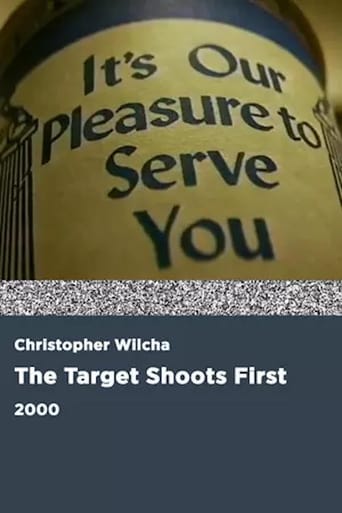Fluentiama
Perfect cast and a good story
SincereFinest
disgusting, overrated, pointless
HottWwjdIam
There is just so much movie here. For some it may be too much. But in the same secretly sarcastic way most telemarketers say the phrase, the title of this one is particularly apt.
Tayloriona
Although I seem to have had higher expectations than I thought, the movie is super entertaining.
uraj
Chris Wilcha has made a small home movie with, it seems, deceit and bitterness as his guides. He paints a bunch of professionals who are minding their own business, trying to get their jobs done the best they can, as a bunch of morons. The unintended result is the depiction of Wilcha's insecurities, jealousy, and general sour grapes. What he doesn't understand is that not everyone in the corporate world is a sell-out, and not everyone who can't make a living is a noble artist. Is it really possible that besides Wilcha's boss Rick Hunt (the only good guy in the whole movie), no one at the company has both a brain AND a heart? Columbia House allowed Wilcha to aim his camera at the company every day, so it seems to me that they had nothing to hide. Wilcha obviously does, but wasn't successful.
phswaddle
Perfect. The most important documentation of the generation x paradox: the wish to be a revolutionary free-spirit and yet having to earn money in a regular job, regular city with regular people. It is an entirely temporal piece, perfectly preserved as a slice of cultural history, impossible to recreate at any other place, at any other time. The documentary is the study of office politics in a Columbia House record club office. Wilcha took his camera into work with him everyday. He quickly becomes the guru of alternative rock within Columbia House, in parallel with the rise of Nirvana, (Nevermind had just exploded in America,) because of his 'youthful' record collection. His promotion after promotion is in direct opposition to his intention to be a creative mind and to increase artistically, not financially. There is certainly an intention to demonstrate this interior battle, but it is his appreciation of people and emotion that makes the documentary so much stronger. The studies of office parties or pregnancies are superb. The film looks beautiful. People and urban landscapes are considered throughout and Wilcha's reality-directorial talent shines through in a fly-on-the-wall experience of the true nature of multinational business. The editing is excellent and unbelievably, the camera's sound is used, no other dubbing was necessary. The film has a naivety similar to Douglas Coupland's book 'Microserfs', and the frustrations of office environments are familiar to both. Coupland fans should definitely strive to see this. I had the honour to meet Wilcha at a viewing last month, he talked of incredibly exciting new work for which I cannot wait. His own experiences within the company share a sad and spooky correlation to the rise and fall of Kurt Cobain within the music industry. Part of the film's genius is this play on reality and fantasy. Whilst speaking to this phenomenally easygoing culture-journalist, I was sure I saw something of Cobain in his eyes. There's a quote which says something like "Nirvana were the band that told America how unhappy it's children were." Perhaps Wilcha is the director that will tell them about their office workers. Paul.
#1 Gracie
I really enjoyed this film when Chris Wilcha presented this movie to me and my class recently. It was a creative concept, well shot, and succeeded in finding what it was going for. Special kudos to Chris for editing that much footage into about an hour and a half long movie. ****, 10/10
dlrooks
Edited from more than 200 hours of footage, "The Target Shoots First" is a young production manager's chronicle of his two-year stint at Columbia House. Its technical merits and fabulous sense of humor earned it both the critics prize and the audience prize at the recent South by Southwest Film Festival in Austin. The audience at the Aurora Picture Show in Houston (where I saw it tonight) was equally enthusiastic. The story begins in 1992, when Columbia House hires recent college graduate Christopher Wilcha as a marketing assistant. He brings his Hi8 to work every day to distance himself from the reality of the job, which turns out to be boring and hilariously out of touch with the popular music scene. As his amount of responsibility increases, he helps design a new, more intelligent catalogue for the burgeoning alternative rock subculture. Readers love the new catalogue, and their letters of praise are encouraging for a while, but Chris's subversive attempts fail when the company manipulates them to suit its agenda. One of the pleasant surprises of Chris's approach is that while he's clearly disgusted with the corporate process at Columbia House, he retains a compassionate attitude toward his coworkers. The emergent tone is one of contemplative frustration with how the company siphons the individual creative energy of its employees to further its own, less admirable goals. Interesting note: I used to get the alternative catalogue in the mail, and I never expected to meet the guy responsible for it (six years later, in Houston).

